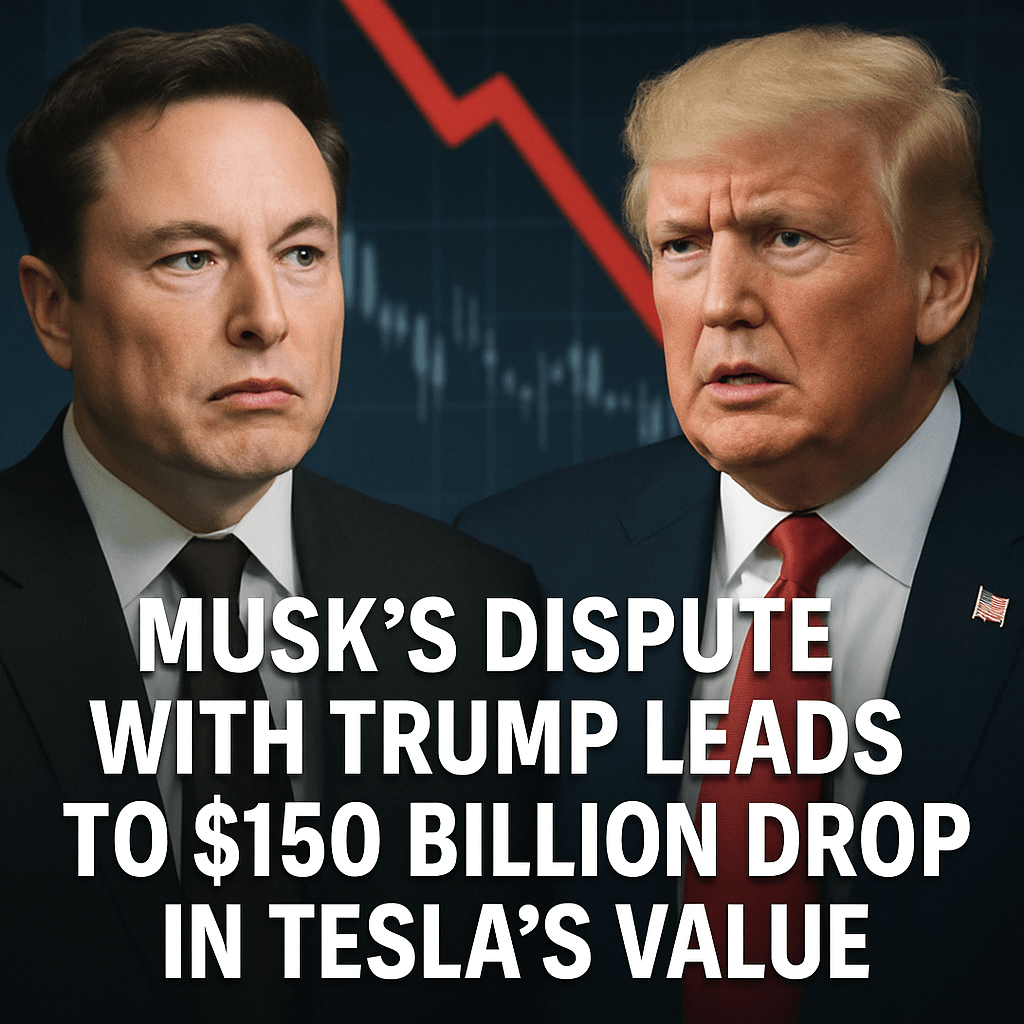Musk’s Dispute with Trump Leads to $150 Billion Drop in Tesla’s Value

In the wake of Donald Trump’s election, investors infused Tesla with hundreds of billions of dollars, betting that political dynamics would significantly impact the company’s financial trajectory. However, witnesses to a recent sharp decline in Tesla’s stock were once again reminded of the inherent risks of intertwining politics with profit.
Market Impact on Tesla: A $150 Billion Hit
Following a heated exchange between President Trump and Tesla CEO Elon Musk, shares of Tesla plunged by over 14% in a single trading day. This drastic decline resulted in a staggering loss of approximately $150 billion in market capitalization. To contextualize this figure, it equates to more than the combined market value of industry stalwarts such as Starbucks and numerous other publicly traded companies.
Following this downward spiral, Tesla’s stock experienced a minor rebound of 0.8% in after-hours trading, perhaps signaling some optimism among investors who see potential in the company’s long-term growth. Nonetheless, the effects of the feud have raised concerns about Tesla’s valuation amid ongoing challenges in the broader electric vehicle (EV) market.
The Source of the Dispute
The conflict began with remarks concerning the President’s latest budget bill, quickly escalating into a personal feud. Musk suggested that Trump benefited from his assistance in the past. In response, Trump threatened to potentially reduce government financial support for Musk’s ventures, namely Tesla and his aerospace company, SpaceX.
“The easiest way to save money in our Budget, Billions and Billions of Dollars, is to terminate Elon’s Governmental Subsidies and Contracts,” Trump stated on his Truth Social platform, adding, “I was always surprised that Biden didn’t do it!”
Regulatory Pressures and Future Implications
As investors process these developments, concerns have emerged about the implications for Tesla’s ambitious plans, particularly regarding its recent announcement about testing an autonomous “robotaxi” service in Austin, Texas. Analysts like Dan Ives from Wedbush Securities fear that an increasingly rigid regulatory environment under Trump could jeopardize these plans, which aim to roll out driverless vehicles in multiple urban centers by 2025.
“The goal of robotaxis is to have them operational in 20 or 25 cities next year,” Ives noted. “However, if the regulatory framework tightens, it could substantially delay this critical path.” Such opinions resonate in an investment landscape that increasingly values autonomy and advanced technologies.
The Broader Implications for SpaceX and Starlink
Importantly, the threat to cut government contracts appears to skew more towards SpaceX, prompting worries about the company’s lucrative contracts with NASA for transporting astronauts and supplies to the International Space Station. SpaceX’s potential to create new revenue streams through evolving contracts could impact its valuation, which was recently estimated at around $350 billion — significantly higher than the previous year’s $210 billion.
Furthermore, Musk’s satellite internet company, Starlink, stands at a crossroads as political affiliations have historically played a role in its growth trajectory. Recent international agreements, including approvals from Saudi Arabia for aviation and maritime use of Starlink, underscore the intertwining of business and politics in the Elon Musk arena.
Investor Sentiment and Future Outlook
Historically, Musk’s close relationship with Trump has bolstered investor confidence significantly, which led to a valuation increase exceeding $450 billion post-election. However, as tensions escalate, analyst perspectives reflect a growing uncertainty surrounding Tesla’s short- and long-term outlook.
With recent developments prompting concerns regarding Musk’s ability to focus on core business operations, investor anxiety has increased. As a result, Musk’s personal stakes in Tesla have taken a substantial hit, with his wealth declining by an estimated $20 billion following the market fallout.
Conclusion: Navigating the Intersection of Politics and Business
The dynamics between high-profile figures like Elon Musk and Donald Trump have created unpredictable ripples in the financial markets. As the world watches closely, the critical question looms: can Tesla navigate this politically charged environment, or will the volatile interplay of words and policy fundamentally reshape its future?
In conclusion, this recent episode serves as a stark reminder of the intricate ties between technology, finance, and geopolitics, wherein personal disputes can yield extensive ramifications for multi-billion dollar corporations.
Source: fortune